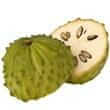Background
- Graviola, or soursop, is a small, upright evergreen tree that is native to tropical South and North America. The tree produces a large, heart-shaped, edible fruit that is sold commercially.
- All parts of the graviola tree, including the fruit, juice, crushed seeds, bark, leaves, and flowers, are used in herbal medicine systems in the tropics. Graviola is mainly used as an alternative treatment for parasitic infections and cancer. It has also been used as a sedative and as a treatment for spasms. Extracts of the leaf, root, stem, and bark of graviola may also be useful to control snail species that carry schistosomiasis (a parasite).
References
- Caparros-Lefebvre, D and Elbaz, A. Possible relation of atypical parkinsonism in the French West Indies with consumption of tropical plants: a case-control study. Caribbean Parkinsonism Study Group. Lancet 7-24-1999;354(9175):281-286.
View Abstract - Enweani, IB, Esebelahie, NO, Obroku, J, et al. Use of soursop and sweetsop juice in the management of diarrhoea in children. J Diarrhoeal Dis Res 1998;16(4):252-253.
View Abstract - Lannuzel, A, Hoglinger, GU, Verhaeghe, S, et al. Atypical parkinsonism in Guadeloupe: a common risk factor for two closely related phenotypes? Brain 2007;130(Pt 3):816-827.
View Abstract - N'Gouemo, P. et al. Effects of ethanol extract of Annona muricata on pentylenetetrazol-induced convulsive seizures in mice. Phytother Res 1997;11(3):243-245.







